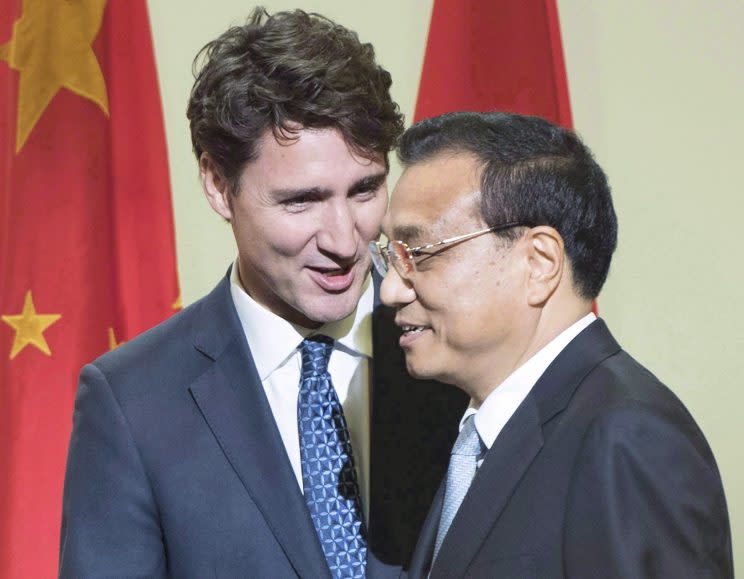Canadians uncomfortable with prospect of free-trade deal with China

With the collapse of the Trans-Pacific Partnership and the potential renegotiation of the North American Trade Agreement looming, the Liberal government is exploring how it could ramp up its relations with China.
However, according to new data, Canadians are uncertain of a potential arrangement with the Asian superpower.
The Nanos Research survey, which polled 1,000 Canadians between April 1-4 on behalf of The Globe and Mail, found that 90 per cent of respondents did not want China’s state-owned companies to have unrestricted access to Canada’s economy.
Furthermore, 88 per cent were uncomfortable or somewhat uncomfortable with the idea of a free-trade deal if it would allow these Chinese enterprises to buy up Canadian tech firms and remove limitations on investment in Alberta’s oil sands.
“There is a significant level of concern and discomfort with an enhanced free-trade arrangement with China,” pollster Nik Nanos told The Globe.
“It is going to take a lot more work for the Liberal government to explain how free trade is good for Canada and how free trade with China will create jobs in Canada. Right now, I think it’s more of a blank slate.”
The Trudeau government has made it clear that Canada is open to trade, especially with growing Asian economies, such as Japan and China.
While U.S. President Donald Trump’s decision to withdraw from the TPP may have effectively killed the 12-nation deal, the signatory countries and others from the region are exploring new options, which could instead involve the largest economy in the Pacific Rim.
Canada’s International Trade Minister, Francois-Philippe Champagne, went as far as to attend a summit in Chile on the subject last month.
According to The Globe, during exploratory talks with the Trudeau government on a bilateral deal earlier this year, the Liberals sought increased access for Canadian companies in several parts of the Chinese market, including agri-food, forestry, clean-and-environmental tech, advanced manufacturing and financial services.
Meanwhile, Beijing pushed for the removal of investment restrictions in the oil sands for state-owned enterprises, open access to the Canadian economy and the lifting of national security screening.
These demands would be at odds with public opinion findings from the Nanos poll, which suggested that Canadians do not want China’s state-owned companies to get unrestricted access to the economy.
The Nanos survey also found that eight out of 10 respondents want security checks to remain in place prior to allowing a state-owned firm to take over a Canadian company in areas such as energy, high technology and advanced manufacturing.
A further 81 per cent opposed or somewhat opposed allowing these purchases to happen without a screening.
“It looks like China is of exceptional concern for our country when it comes to our national security and national sovereignty,” Nanos told The Globe.
The Globe also reported that human rights are not part of the trade talks between the two countries.
This too would clash with the findings from the Nanos Research survey that indicated 66 per cent of Canadians believe that human rights should be on the table during negotiations.
“The Liberals portray themselves as principled on the environment, on women’s issues, on human rights issues, on the United Nations and I think it is likely a political risk for them to set aside human rights for free trade with China,” Nanos told The Globe.
A previous poll, conducted by the Angus Reid Institute in February, on which countries or regions Canada should pursue closer trade with, indicated that most prefer to maintain the nation’s longstanding ties to the U.S.
Nearly 49 per cent of respondents favoured continued focus on the U.S., with the European Union coming in at a distant second with 33 per cent, while China and Britain tied for third with 29 per cent.

 Yahoo Finance
Yahoo Finance 
